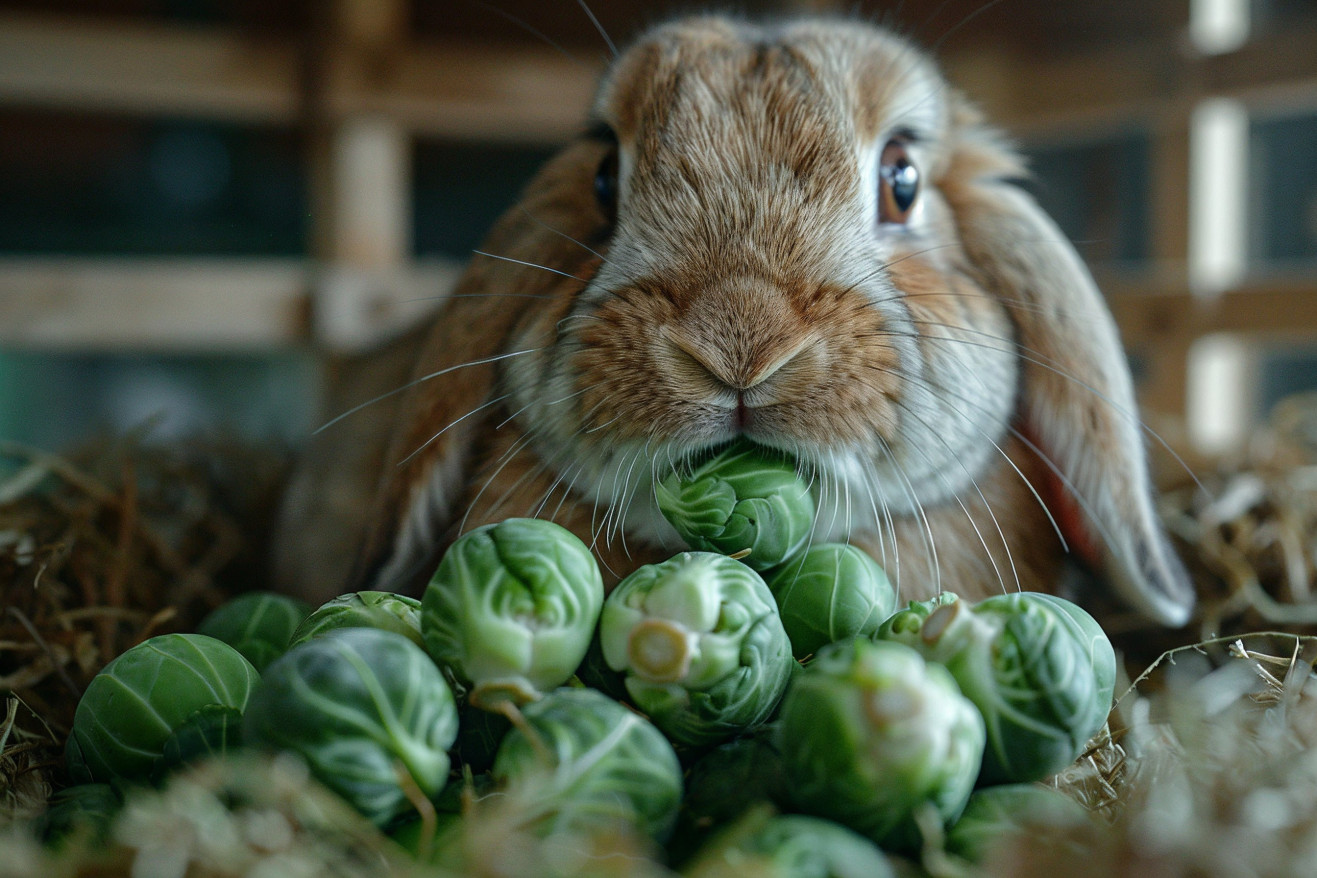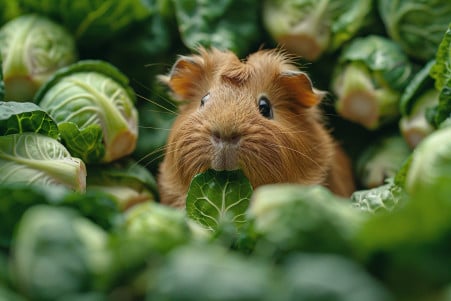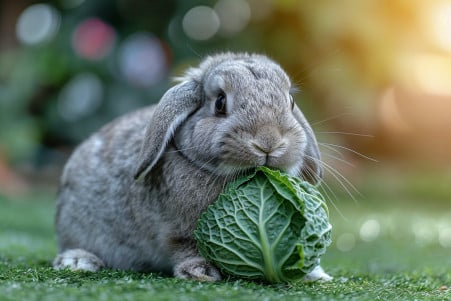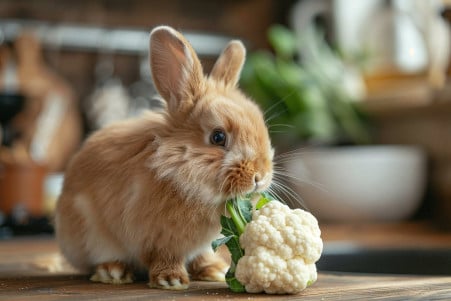Can Rabbits Eat Brussels Sprouts? A Guide to Safe Feeding Practices
18 February 2024 • Updated 18 February 2024

Brussels sprouts are full of important nutrients, but are they safe for rabbits to eat? Rabbits can have Brussels sprouts in small amounts as a treat. Because Brussels sprouts are nutrient-dense and high in fiber, it’s important to be cautious when feeding them to rabbits so they don’t experience digestive upset. Stick to a few small sprouts at a time and make sure they’re part of a well-rounded meal.
By taking a deep dive into rabbit nutrition, we’ll cover a wide range of research and expert advice from the fields of veterinary medicine, animal nutrition, and pet care. This way, we can learn about the nutritional value and potential drawbacks of feeding rabbits Brussels sprouts, as well as how to best introduce and control the portions of this vegetable in a rabbit’s diet.
Can rabbits eat Brussels sprouts?
The Nutritional Benefits of Brussels Sprouts for Rabbits
In addition to being a nutritional powerhouse for people, Brussels sprouts can provide many of the same advantages for rabbits if they are fed to the animals in the right way.
These cruciferous vegetables are an excellent source of several important nutrients, including vitamins K and C, fiber, and antioxidants.
According to Healthline, a half-cup serving of cooked Brussels sprouts contains a whopping 91% of the Daily Value for vitamin K and 53% for vitamin C, both of which are important for blood clotting, bone health, wound healing, and immune function. Plus, their high nutrient content and low calorie count can help rabbits maintain a healthy weight and get the nutrients they need.
While the fiber in Brussels sprouts can help humans maintain a healthy digestive system, it is also important for rabbits to consume enough fiber to keep their digestive systems functioning properly.
Supreme Petfoods explains that rabbits need a diet high in fiber to keep their digestive systems working properly, and this includes supporting processes like hindgut fermentation and the production of cecotrophs, which are important for their nutrition.
Meanwhile, Medical News Today explains that the antioxidants and anti-inflammatory properties of Brussels sprouts are responsible for many of their health benefits, although more research is needed to understand how these properties affect rabbits.
In terms of the nutritional needs of rabbits and the nutrients found in Brussels sprouts, there is a lot of overlap, especially when it comes to fiber and vitamins. However, it’s not just the nutrients that matter, it’s how the rabbit’s unique digestive system processes these nutrients, which is why it’s important to think about the rabbit’s diet as a whole.
The Complex Digestive System of Rabbits: How They’ve Evolved to Eat High-Fiber Diets
Rabbits are not only known for their fun-loving personalities but also for their complex digestive systems. As explained by Veterinary Clinics: Exotic Animal Practice, rabbits are herbivores that practice hindgut fermentation, which is a way of breaking down fibrous plant material. Their digestive system has evolved to process and separate the digestible and indigestible parts of their food, excreting fibrous waste quickly while absorbing nutrients through a process called cecotrophy.
The high-fiber diet that rabbits need to eat to maintain their health is a result of the need to support this complex digestive system. Purina Animal Nutrition notes that rabbits, like horses, are hindgut fermenters and need to eat a diet that’s high in good-quality fiber to support a healthy cecal microbial population. These microbes ferment fiber, producing volatile fatty acids, which rabbits then absorb to use as an energy source.
In addition to regular fecal pellets, rabbits produce cecotrophs, which are nutrient-rich pellets that are the result of cecal fermentation. As explained by the Rabbit Welfare Association & Fund, rabbits eat these cecotrophs to absorb the nutrients they contain.
When it comes to feeding rabbits new foods like Brussels sprouts, it’s important to think about how the new food will impact this complex system. The nutrients in Brussels sprouts could be a good addition to a rabbit’s high-fiber diet. However, any new food needs to be introduced carefully to avoid disrupting the rabbit’s digestive system.
How to Feed Brussels Sprouts to Your Rabbit
Because rabbits can be sensitive to new foods, it’s important to introduce Brussels sprouts to your rabbit’s diet gradually. Rabbits have delicate digestive systems, and sudden changes to their diet can lead to digestive problems, including GI stasis. Therefore, Small Pet Select and the People’s Dispensary for Sick Animals (PDSA) both recommend a transition period of two to four weeks.
To start, mix a small amount of finely chopped Brussels sprouts in with your rabbit’s current leafy greens and see how your rabbit reacts. If they eat the Brussels sprouts and don’t experience any digestive issues, you can gradually increase the amount of Brussels sprouts in the mix.
Throughout this process, be on the lookout for signs of digestive distress, such as a lack of appetite, lethargy, teeth grinding, or changes in stool, which could indicate that your rabbit is having trouble tolerating the new food.
As The Rabbit House notes, it’s also important to keep an eye on your rabbit’s weight and droppings to make sure their diet is still working for them. If you notice any changes in your rabbit’s behavior or elimination, you may need to reevaluate their diet.
However, if you’re careful to monitor your rabbit’s diet and make any necessary adjustments, you can add Brussels sprouts to your rabbit’s diet in a way that supports their well-being and helps them avoid digestive problems.
Warning: Know the Dangers of Feeding Rabbits Brussels Sprouts
Although rabbits can eat Brussels sprouts, it’s important to understand the potential dangers. These vegetables contain compounds that can cause gas, which can cause discomfort, bloating, or even more severe digestive issues like GI stasis, a condition in which the digestive system slows down or stops completely.
According to the Merck Veterinary Manual, disruptions in a rabbit’s sensitive gut flora, for instance by foods high in certain compounds or sugars, can lead to fatal gastrointestinal upsets.
Feeding rabbits Brussels sprouts in moderation is necessary to avoid any toxic effects and ensure that the benefits of feeding them the vegetable outweigh the risks. Rabbits need a high-fiber diet because their large cecum contains microorganisms that help ferment food and absorb nutrients.
Rabbits get up to 40% of their calories from volatile fatty acids produced during cecum fermentation. Feeding rabbits Brussels sprouts, which are high in fiber, can help support this process if it’s done in the right way.
The RSPCA recommends a varied diet that includes a range of leafy greens and vegetables. To minimize the risks, introduce Brussels sprouts and other new foods slowly and watch for any signs of digestive issues.
Of course, a well-rounded diet that meets an individual rabbit’s specific nutritional needs is always the most important thing for their well-being. If you’re ever unsure about what you’re feeding your rabbit, it’s best to ask a vet for advice.
Final Thoughts on Giving Brussels Sprouts to Rabbits
So, can rabbits eat Brussels sprouts? In summary, rabbits can eat Brussels sprouts in moderation as part of a well-balanced diet. When introduced properly, Brussels sprouts can provide rabbits with important vitamins and fiber that can support their overall health.
That said, it’s important to remember that rabbits have sensitive digestive systems and need to be introduced to new foods slowly. This will help prevent digestive issues like gas and more serious conditions like GI stasis.
As discussed, rabbits need to eat a diet that’s high in fiber, and Brussels sprouts can help support that. However, because they can cause gas and rabbits’ digestive systems can be finicky, it’s important to be cautious when adding new foods to their diets.
While Brussels sprouts can be part of a well-balanced diet for rabbits, it’s important to remember that they shouldn’t replace the other foods that rabbits need to eat. In addition to a variety of other vegetables, rabbits need to eat hay, drink fresh water, and eat other vegetables to get the nutrients they need.
It’s important to talk to a vet about your rabbit’s specific dietary needs so that you can get personalized advice. By working with a vet to make sure that you’re feeding your rabbit the right foods, you can make sure that you’re keeping your pet healthy and happy.


